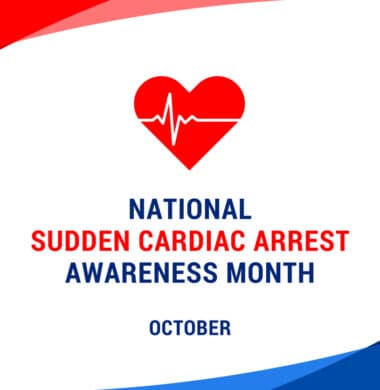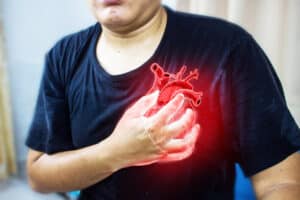Difference Between Heart Attack and Sudden Cardiac Arrest

Heart attack and cardiac arrest are two common heart issues that are often confused with one another. While they are both medical emergencies that occur suddenly and can potentially be fatal, they are actually two very distinct conditions with different causes, risk factors and treatments. Understanding the difference between these two serious cardiac events is important and can help ensure you receive the proper treatment.
October is Sudden Cardiac Arrest Awareness Month. This condition is a leading cause of death in the United States, accounting or over 356,000 fatalities every year. Sudden Cardiac Arrest Awareness Month seeks to increase public awareness of the signs and symptoms of this dangerous condition to ensure early intervention when appropriate and prompt medical treatment after cardiac arrest occurs.
At South Denver Cardiology, we want to commemorate Sudden Cardiac Arrest Month by providing our patients and the general public with important information about this dangerous condition. The following overview will help you understand the difference between heart attack and cardiac arrest so that you can take the proper action in the event that you experience one of these events.
What Is a Heart Attack?
A heart attack occurs when an artery becomes blocked, preventing blood from reaching the heart. This stops one or more areas of the heart from receiving proper amounts of oxygen. Without prompt treatment, the damage to the portion of your heart muscle fed by the blocked artery will become greater until it eventually begins to die.
Because heart attacks are caused by a blockage to your artery, they are considered a “plumbing issue.” This blockage is typically due to a buildup of plaque in your arteries, a condition called coronary artery disease. When this plaque buildup becomes so severe that it restricts blood flow to the heart, the risk of suffering a heart attack increases. In some instances, a piece of plaque can break off and get lodged in a different area of the artery, causing a blockage in this new region.
Warning Signs of a Heart Attack

- Chest pain or pressure
- Shortness of breath
- Tightness in the chest
- Sweating
- Nausea
- Pain that spreads into the neck, shoulders, arm or jaw
- Sudden dizziness or lightheadedness
- Brief loss of consciousness
Risk Factors of Coronary Artery Disease
Slow plaque buildup in your arteries is a natural occurrence for everyone. However, there are certain risk factors that can increase the likelihood that this buildup will become so severe that you develop coronary artery disease. These include:
- Family history of coronary artery disease
- Obesity
- Medical conditions which contribute to plaque buildup such as diabetes, high cholesterol and high blood pressure
- Smoking
While risk factors such as family history are unavoidable, there are steps you can take to manage many of the other risk factors and reduce your risk of a heart attack:
- Eat a healthy diet
- Exercise regularly
- Avoid ultra-processed foods and foods high in saturated fats
- Actively manage diabetes, high cholesterol and high blood pressure if you suffer from these conditions
- Quit smoking
- Lose weight if you are obese
What Is Sudden Cardiac Arrest?

Cardiac arrest is much different than a heart attack. During a heart attack, your heart generally continues to beat and only the blood supply to the heart is affected. In addition, cardiac arrest is not considered a “plumbing issue” impacting the flow of blood through your arteries but instead is an “electrical issue” that occurs when your heart’s electrical system malfunctions.
Warning Signs of Sudden Cardiac Arrest
Cardiac arrest typically occurs suddenly and unexpectedly, so there often aren’t any warning signs prior to the event. However, some cardiac arrest survivors have reported experiencing the following warning signs prior to their heart stopping:
- Dizziness
- Chest pains
- Unexplained shortness of breath
- Nausea or vomiting about an hour prior to the incident
- Seizures (usually in the arms or legs)
Causes and Risk Factors of Sudden Cardiac Arrest
There are several risk factors that can increase your chances of experiencing sudden cardiac arrest. Individuals with an arrhythmia (irregular heartbeat) are often at increased risk of cardiac arrest. In addition, a previous heart attack can sometimes result in an irregular or erratic heartbeat that may trigger cardiac arrest.
Cardiac arrest is most commonly caused by a pre-existing heart condition that can result in an arrhythmia. These may include:
- Cardiomyopathy (enlarged heart)
- Heart failure
- Coronary artery disease
- Congenital heart disease
- Valvular heart disease
- Electrical problems in the heart
In addition, it’s possible for a noncardiac health condition to trigger cardiac arrest. Pulmonary embolism, which occurs when a blood clot creates a blockage in the lungs, causes approximately 4-10% of all cardiac arrests and is the most common noncardiac health condition that is responsible for a stoppage of your heartbeat.
How to Tell the Difference Between a Heart Attack and Cardiac Arrest

- Heart attack victims usually remain conscious, experience chest pain and can describe their symptoms.
- Sudden cardiac arrest victims typically collapse, become unresponsive and stop breathing.
Immediate emergency treatment will be required to save your life after cardiac arrest.
When to Call for Emergency Medical Services
Due to the potentially fatal nature of both conditions, it’s critical to call 911 immediately and request emergency medical treatment if you experience symptoms of either a heart attack or cardiac arrest. Prompt action can mean the difference between life and death.
South Denver Cardiology Can Help
At South Denver Cardiology, we’re committed to delivering the critical treatments you need to manage your heart condition and reduce the risk of heart attack or cardiac arrest:
- Our Prevention Cardiology Clinic provides comprehensive diagnostic evaluation, risk stratification and management to help you prevent cardiovascular disease events such as a heart attack
- Our Arrhythmia Clinic can help you manage a wide range of arrhythmias, helping you reduce the likelihood of cardiac arrest
- Our electrophysiology team specializes in the detection and treatment of abnormal heart rhythms, helping you manage one of the primary risk factors of cardiac arrest
- Our Cardiac Rehabilitation Clinic provides a variety of treatments that play an integral role in your recovery after a heart attack
Contact us today to schedule an appointment. South Denver Cardiology serves patients in Denver, Littleton and the surrounding areas.
- Common Heart Attack Symptoms Among Women - February 6, 2026
- Heart Failure: Symptoms and Management - February 4, 2026
- Heart Disease 101: What You Need to Know - February 2, 2026
Sign Up
As with any health concerns, your specific treatment program should be discussed thoroughly with your primary care physician as well as any specialists who may need to be consulted – like a cardiologist.
Sign Up
